英语泛读教程unit3recycling
(完整版)英语泛读教程 unit 3 recycling

7PdETifofrePrEeTnEt types of plaHsDtPiEc
(Polyethylene
(high-density
TYPES of Glass Products can be recycled
•Beverage containers •Food Jars
Benefits of recycling of Recycling glass
✓Can be recycled over again and never lose its quality or quantity ✓Creates 20%less air pollution ✓Reduces water pollution by 50% ✓Saves energy to light a 100-watt light bulb ✓Reduces that amount of landfill space that is used
Saves energy
Produces less greenhouse
Prevents the destruction of natural habitats
Decreases soil erosion associated with mining and logging
Let’s see!
•Recycled Plastic: Reduces greenhouse gas emission/ can be made into plastic lumber, which is durable
《泛读教程》_第三册(Unit1~Unit10)
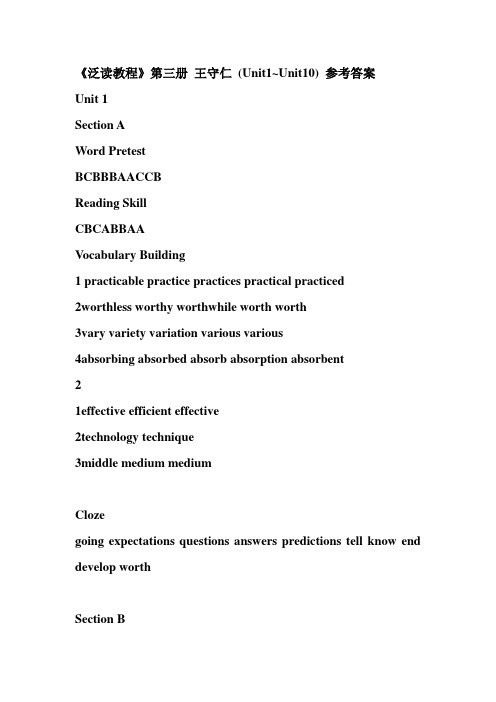
《泛读教程》第三册王守仁(Unit1~Unit10) 参考答案Unit 1Section AWord PretestBCBBBAACCBReading SkillCBCABBAAVocabulary Building1 practicable practice practices practical practiced2worthless worthy worthwhile worth worth3vary variety variation various various4absorbing absorbed absorb absorption absorbent21effective efficient effective2technology technique3middle medium mediumClozegoing expectations questions answers predictions tell know end develop worthSection BTFTT CBCC TFF CAACCASection CFFTFFTTTUnit 2Section AWord PretestABACCABABCCReading SkillCBB FTFFTTVocabulary Building11mess 2preference 3aimlessly 4remarkable 5decisive 6shipment 7fiery 8physically 9action 10housing21aptitude attitude2account counted counted3talent intelligenceClozeother just has some than refuse see that without if ready wrongSection BACCCCCCCACBABASection CCCDDACUnit 3Section AWord PretestABCCBDCDCReading SkillBABCAACBCVocabulary Building1Admission admit admissible admissiblyReliance rely reliable reliablyDefinition define definite definitelyAssumption assume assumed assumedlyBehavior behave behavioral behaviorallyVariety vary various variouslyPart part partial partiallyManager manage managerial manageriallyCorrelation correlate correlative correlativelyAdaptation adapt adaptive adaptively21inspired aspired inspired2token badges token3contemporaries temporary contemporaryClozeCommunicate ways using in of message meet causes meaning to eyesSection BBABBAC FFTTTF CCBSection CBBDDBCCA FFTFFTUnit 4Section AWord PretestCACAABBBCCReading SkillBBACBCCAAVocabulary Building11moist 2betrayal 3exclusively 4inhumane 5amazed 6endangered 7marvels 8deadly21dessert deserted2favourite favorable favorable3awarded reward awardedClozeParents idea at seen landmarks instance migrate guide pole effect it if experimentsSection BCCB FTF BCACCBACCSection CFFTFFFTTFTUnit 5Section AWord PretestCAABCACCCReading SkillCABCB FFTFTTVocabulary Building1Assumption assume assumed assumedly Acknowledgement acknowledge acknowledgedly Reflection reflect reflective reflectively Domination dominate dominant dominantly Category categorize categorical categoricallyImplication imply implicative implicativelyReassurance reassure reassuring reassuringlyDefinition define definite definitely21historical historic2rejected resist3test analyzedClozeExisted over head body found language use single passed ahead survival handlingSection BCABCBB TTTFTT CACSection CBBAAACBCUnit 6Section AWord PretestC ACBABACABABReading SkillCAACACCAVocabulary BuildingAvailability avail available availablyConquest conquer conquering conqueringlyLuxury luxuriate luxurious luxuriouslyOrgin orginate original originallyOccurrence occur occurrentSystem systematize systematical systematicallyPhonology (这个是没有动词形式的)phonological phonologicallyDecision decide decided decidedlyVariety vary various variouslySuperiority (这个是没有动词形式的)superior superiorlyPeculiar particular particularAssess access accessResources source sourcesClozeSex men differs compliment complimenting causes makes languages have outside understood have use circleSection BCBBBACBCCCCBACCBASection CBBCABBACCBUnit 7Section AWord PretestABABCBACReading SkillBBBCCBCBVocabulary BuildingDeduced behavior adhere replacement option delicacy enormous pursuitInquired required inquire requiredCompatible comparable compatible comparableClozeSatellite some space asked life sort orbiting have living were believe own solar where likely living throughSection BFTFFTTTTTFFFBBCACCSection CBCBCCAEDEBAFDCUnit 8Section AWord PretestBCABCBBCCAReading SkillCBABCBCCCCVocabulary BuildingOccupation occupy occupational occupationallySegregation segregate segregated(这个没有副词)Discrimination discriminate discriminating discriminatingly Enforcement enforce enforceable enforceablyExclusion exclude exclusive exclusivelyPerseverance persevere persevering perseveringlyConviction convict convictive convectivelyAmendment amend amendable(这个没有副词)Superficiality superficialize superficial superficially Spectator spectate spectatorial (这个没有副词)Job career jobs careerPrincipal principles principal principleFeminine female feminineClozeAcceptable domestic property wages husband divorce claims legal suit permitted make excluded lacked belonged determined Section BBACCCCACCCAABBACTTFSection CCCAACBUnit 9Section AWord PretestBAABCACBBABCReading SkillCACCBBBBBACBVocabulary BuildingTypifies dominant familial competitive vibrate descended departure boom countless symbolizesRecreation recreates recreationRhythm rhyme rhymes rhythmClozeSea within of divides built celebrated inside attract together whenSection BFTFTTCCBBCBAACCACSection CBAACABCCCCUnit 10Section AWord PretestCABCBBBBABReading SkillCBCACCCABBVocabulary BuildingConsequence(这个没有动词形式)consequent consequently Sophistication sophisticate sophisticated sophisticatedly Reference refer referable referablyConversation converse conversational conversationally Space space spatial spatiallyDetachment detach detachable detachablyIntervention intervene intervening(这个没有副词)Type typify typical typicallyAssure ensure assured ensureArises raised rise raised arisenClue cues clue cueClozeWell separating is own close need look order respect follow prior sign help was elseSection BBBCTTFBCACACTFFSection CTFFTFFFF。
泛读教程(三)课后题答案(Unit 1-15)

《泛读教程》第三册课后题答案Unit1Section AVocabulary Building:I.1.practical,practice,practices,practical,practiced2.worthless,worthy,worthwhile,worth,worth3.vary,variety,variation,various,Various4.absorbing,absorbed,absorb,absorption,absorbentII.1.effective,efficient,effective2.technology,technique3.middle,medium,mediumClozeGoing/about/trying,expectations/predictions,questions,answers,predictions/expectations,tell, know/foretell,end,develop/present,worthSection BTFTT,CBCC,TFF,CAA,CCAUnit2Section AVocabulary Building:I.mess,preference,aimlessly,remarkable,decisive,shipment,fiery,physically,action,housing II.1.aptitude,attitude2.account,counted,counted3.talent,intelligenceClozeOther,just/only,has,some/many,than,refuse,see/know/understand,that,without,If, ready/willing/educated/taught,wrong/incorrect/erroneousSection BACC,CC,CCC,ACB,ABASection CCCDDACUnit3Section AVocabulary Building:I.Noun Verb Adjective Adverbadmission admit admissible Admissiblyreliance rely reliable Reliablydefinition define definite Definitely assumption assume assumed/assuming Assumedly/assumingly behavior Behave behavioral Behaviorallyvariety Vary Various/varied Variously/variedly Part/partiality Part partial Partiallymanager manage managerial Managerially correlation correlate correlative Correlatively Adaptation adapt adaptive adaptivelyII.1.inspired,aspired,inspired2.token,badges,token3.contemporaries,temporary,contemporaryClozeCommunicate,ways/means/ones,using/saying,in,of,message,meet/have/encounter/experience, causes,meaning,to,eyesSection BBAB,BAC,FFT,TTF,CCBSection CBBDDBCCAFFTFFTUnit4Section AReading Skill:Skimming2-10BBAC BCCAAVocabulary Building:I.moist,betrayal,exclusively,inhumane,amazed/amazing,endangered,marvels,deadlyII.1.dessert,deserted2.favorite,favorable,favorable3.awarded,reward,awardedClozeParents,idea,at/by,seen,landmarks,instance/example,migrate,guide/direct,pole,effect/ influence,It/This,if/whether,experimentsSection BCCB FTF BCA CCB ACCSection CFFTFF FTTFFUnit5Section AVocabulary Building:I.Noun Verb Adjective Adverbassumption assume assumed/assuming assumedly/assumingly acknowledgement acknowledge acknowledged acknowledgedly reflection reflect reflective reflectively domination dominate dominant dominantlycategory categorize categorical categorically implication imply implicative implicatively reassurance reassure reassuring reassuringly definition define definite definitelyII.1.Historical,historic2.rejected,resist3.test/analyze,analyzedClozeExisted/appeared,ever,head/brain,body,found,language,use/value/significance/importance, single,passed,ahead,survival/existence,handling/overcomingSection BCAB CBB TTT FTT CACSection CBBAA ACBCUnit6Section AWord Pretest:CACBA BACAB ABVocabulary Building:I.availability avail available Availablyconquest conquer Conquering/Conqueringlyconqueredluxury luxuriate luxurious Luxuriouslyorigin originate original Originally occurrence occur Occurrentsystem systematize Systematical/Systematicallysystematicphonology phonological Phonologicallydecision decide Decided/decisive Decidedly/decisively variety vary various Variously superiority superior SuperiorlyII.1.peculiar,particular,particular2.assess,access,access3.resources,source,sourcesClozeSex,Men,differs,compliment/words,complimenting,causes,makes,languages,have,outside, understood,have,use,circle/world/fieldSection BCBBBA CBCCC CBACC BASection CBBCAB BACCBUnit7Section AWord PretestABABC BACVocabulary Building:I.deduced,behavior,adhere,replacement,option,delicacy,enormous,pursuitII.1.inquired,required,inquire,requiredpatible,comparable,compatible,comparableClozeSatellite,some,space,asked/wondered,life,sort/kind,orbiting/going/circling,have,living, were,believe,own,solar,where,likely,living,throughSection BFTFFT TTTTF FFBBC ACCSection CBCBCC AEDEBAFDCUnit8Section AVocabulary Building:1.occupataion,occupy,occupational,occupationallysegregation,segregate,segregateddiscrimination,discriminate,discriminating/discriminatory,discriminatingly/discriminatorily enforcement,enforce,enforceable,enforceablyexclusion,exclude,exclusive,exclusivelyperseverance,persevere,persevering,perseveringlyconviction,convict,convictive,convictivelyamendment,amend,amendablesuperficiality,superficialize,superficial,superficiallyspectator,spectate,spectatorial2.1.a.job b.career c.jobs d.career2.a..principal b.principles c.principal d.principle3.a.feminien b.female c.feminineClozeAcceptable,domestic,property,wages,husband,divorce,claims,legal,suit,permitted,make, excluded,lacked,belonged,determinedSection BBACCB CACCC AABBA C TTFSection CCCAACBUnit9Section AVocabulary Building:1.1.typifies2.dominant3.familialpetitive5.vibrate6.descended7.departure8.boom9.countless10.symbolizes2.1.a.recreative b.recreates c.recreation2.a.rhythm b.rhyme c.rhymes d.rhythmClozeSea,within,of,divides,built/constructed/completed,celebrated,inside/in,attract,together,whenSection BFTFTT CCBBC BAACC ACSection CBAACA BCCCCUnit10Section AVocabulary Building:1.consequence,,consequent/consequential,consequently/consequentially sophisticatiion,sophisticate,sophisticated,sophisticatedlyreference,refer,referable,referablyconversation,converse,conversational,conversationallyspace,space,spatial/spacious,spatially/spaciouslydetachment,detach,detachable/detached,detachably/detachedlyintervention,intervene,interveningtype,typify,typical,typically2.1.assure,ensure,assured,ensure2.arises,raised,rise,raised,arisen3.clue,cues,clue,cueClozeWell,separating/isolating,is,own,close,need,look,order,respect,follow,prior,sign/cue,help, was/were,elseSection BBBC TTF BCA CAC TFFSection CTFFTF FFFUnit11Section AVocabulary Building:1.information,inform,informative,informativelyspecification,specify,specific,specificallyaddition,add,additional/additive,additionally/additivelyspecialty,specialize,special,speciallynarration,narrate,narrative,narrativelyextension,extend,exxtensive,extensivelyorigin,originate,original,originallyexplosion,explode,explosive,explosivelyambiguity,,ambiguous,ambiguouslyestablishment,establish,established1.extension2.mabiguity3.orignal4.specified5.additional6.unambiguously7.explosionrmation9.specialized10.narrative11.establishment2.1.transform,transferred,transferred,transformed2.lonely,alone,lonely,aloneClozeLibrary,amounted,own,burned/destroyed,countries’,send,suggestion/proposal,librarySection BACBCB ACCAC ABABB ABSection CBCACC CBCCCUnit12Section AVocabulary Building:1.reaction,mass,polluting,planetary,suspicious,alarming,emitted,emerged2.1.warned,threatened2.spread,spread,sprayed3.emergency,emergenceClozeSolve,communities,creative,prevention,disposal,resources,recycloing,waste,increase,place, measures,amountSection BFFTT BCAC FTFF ABC CBCSection CBCAAC CBCUnit13Section AVocabulary Building:1.symptom,symptomize,symptomatic,symptomaticallylonging,long,longing,longinglyaddition,add,additional additive,additionally/additivelymanifestation,manifest,manifest,manifestlydepression,depress,depressed/depressing,depressedly/depressinglyinvariability,,invariable,invariablyseparation,separate,separate,separatelycondemnation,condemn,condemnable,condemnablyimagination,imagine,imaginary,imaginarilyaffection,affect,affecting,afeectingly2.1.remedies,recipe,remedy,recipe2.alternate,altered,alternate,alter3.acknowledged,knowledge,acknowledgedClozeStep,acknowledge,prevent,essential,physician,due,physical,psychosomatic,disease, confidence,symptoms,thorough,emotional,upsettingSection BCBCAB CBBCB ABCACSection CTFFFT FTFFFUnit14Section AVocabulary Building:1.reluctant,evolution,atrributed,catastrophic,assoicate,indifferent,emerged,stir2.1.evolved,revolved,evolved2.dismay,dismal,dismal,dismay3.contribute,attributed,contributed,attributedClozeCharacteristic/trait/nature,changed/had,to,long,get/eat,possessed/developed/had,stretched /lengthened,longer,passed,After,have,theory,effect/influence,notion/idea,changeSection BDAB FTFTF DAD BAC FTFSection CTFTFT FTFUnit15Section AVocabulary Building:1.Prevention,prevent,preventive,preventivelyFederation,federate,federal,federallyInadequacy,,inadequate,inadequatelyDeception,deceive,deceptive,deceptivelyProsperity,prosper,prosperous,prosperouslyLife,live,live/living/aliveEffect,effect,effective,effectivelyEvaluation,evaluate,evaluable/evaluativeResident,reside,residential,residentiallyVision,vision,visional/visionary,visionally/visionarity1.evaluabtion,2.federal3.prosperity4.residential5.effect6.are living7.deceptively8. preventive/effective2.1.simile,metaphor2.ultimate,unanimous,ultimate,unanimousClozeTransportation,distance/away,ground,Steam,trains,electric,station/stop,name,train,three, trains,stairs/steps,passengers/peopleSection BDCDCC CCCAB CBSection CCCACC CCC。
(完整版)《英语泛读教程2》教案
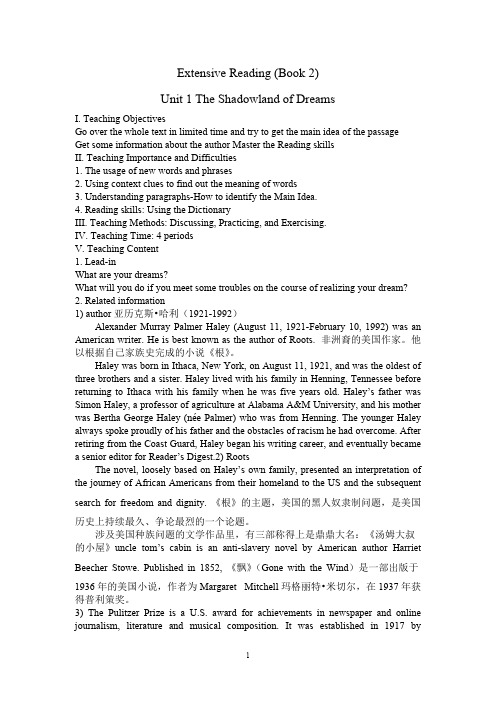
Extensive Reading (Book 2)Unit 1 The Shadowland of DreamsI. Teaching ObjectivesGo over the whole text in limited time and try to get the main idea of the passage Get some information about the author Master the Reading skillsII. Teaching Importance and Difficulties1. The usage of new words and phrases2. Using context clues to find out the meaning of words3. Understanding paragraphs-How to identify the Main Idea.4. Reading skills: Using the DictionaryIII. Teaching Methods: Discussing, Practicing, and Exercising.IV. Teaching Time: 4 periodsV. Teaching Content1. Lead-inWhat are your dreams?What will you do if you meet some troubles on the course of realizing your dream? 2. Related information1) author亚历克斯•哈利(1921-1992)Alexander Murray Palmer Haley (August 11, 1921-February 10, 1992) was an American writer. He is best known as the author of Roots. 非洲裔的美国作家。
泛读教程第三册答案---精品模板

Keys to Reading Course 3 Unit 1 Reading StrategiesSection AWord Pretest1-5。
BCBBB 6-10。
AACCBReading Skill2-5。
CBCA 6—9。
BBAAVocabulary Building1。
a. practicable/practicalb. practicec. practices d。
practicable/practical e。
practiceda. worthlessb. worthy c。
worthwhile d. worth e. wortha. vary b。
variety c。
variation d. various/varied e. Variousa. absorbingb. absorbedc. absorb d。
absorption e。
absorbent2。
1。
a. effective b。
efficient c. effective2. a. technology b. technique3. a。
middle b。
medium c. mediumClozegoing/about/trying expectations/predictions questions answerspredictions/expectations tell know/foretell end develop/present worthSection B1—5. TFTTC 6—10. BCCTF 11-14:FCAAC 16-17:CASection C1-5. FFTFF 6—8. TTTUnit 2 EducationSection AWord Pretest1-5. ABACC 6—8。
ABAReading Skill4-6。
CBB 1—6。
FTFFTTVocabulary Building1.mess 2。
英语泛读教程3第三版Unit3
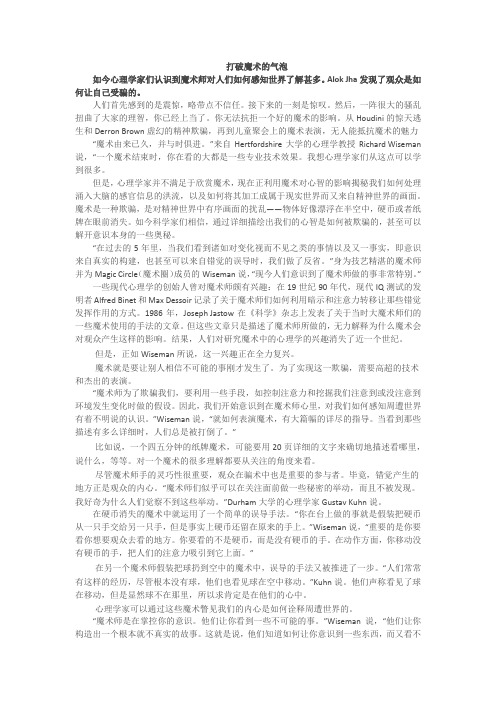
打破魔术的气泡如今心理学家们认识到魔术师对人们如何感知世界了解甚多。
Alok Jha发现了观众是如何让自己受骗的。
人们首先感到的是震惊,略带点不信任。
接下来的一刻是惊叹。
然后,一阵很大的骚乱扭曲了大家的理智,你已经上当了。
你无法抗拒一个好的魔术的影响。
从Houdini的惊天逃生和Derron Brown虚幻的精神欺骗,再到儿童聚会上的魔术表演,无人能抵抗魔术的魅力“魔术由来已久,并与时俱进。
”来自Hertfordshire大学的心理学教授Richard Wiseman 说,“一个魔术结束时,你在看的大都是一些专业技术效果。
我想心理学家们从这点可以学到很多。
但是,心理学家并不满足于欣赏魔术,现在正利用魔术对心智的影响揭秘我们如何处理涌入大脑的感官信息的洪流,以及如何将其加工成属于现实世界而又来自精神世界的画面。
魔术是一种欺骗,是对精神世界中有序画面的扰乱——物体好像漂浮在半空中,硬币或者纸牌在眼前消失。
如今科学家们相信,通过详细描绘出我们的心智是如何被欺骗的,甚至可以解开意识本身的一些奥秘。
“在过去的5年里,当我们看到诸如对变化视而不见之类的事情以及又一事实,即意识来自真实的构建,也甚至可以来自错觉的误导时,我们做了反省。
”身为技艺精湛的魔术师并为Magic Circle(魔术圈)成员的Wiseman说,“现今人们意识到了魔术师做的事非常特别。
”一些现代心理学的创始人曾对魔术师颇有兴趣:在19世纪90年代,现代IQ测试的发明者Alfred Binet和Max Dessoir记录了关于魔术师们如何利用暗示和注意力转移让那些错觉发挥作用的方式。
1986年,Joseph Jastow在《科学》杂志上发表了关于当时大魔术师们的一些魔术使用的手法的文章。
但这些文章只是描述了魔术师所做的,无力解释为什么魔术会对观众产生这样的影响。
结果,人们对研究魔术中的心理学的兴趣消失了近一个世纪。
但是,正如Wiseman所说,这一兴趣正在全力复兴。
(完整版)《英语泛读教程2》教案
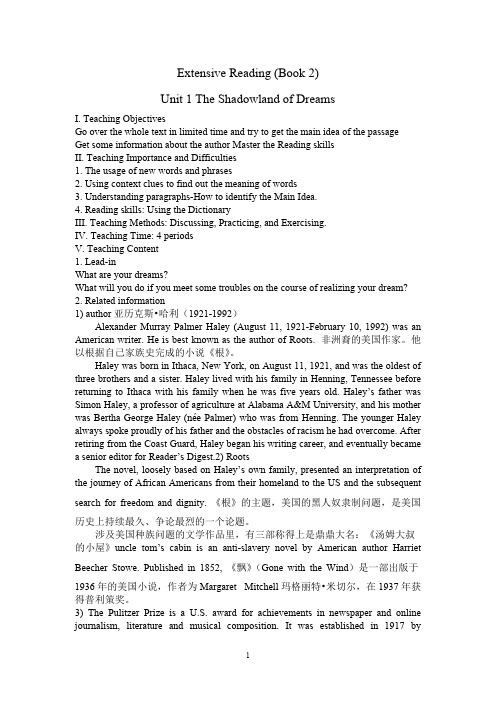
Extensive Reading (Book 2)Unit 1 The Shadowland of DreamsI. Teaching ObjectivesGo over the whole text in limited time and try to get the main idea of the passage Get some information about the author Master the Reading skillsII. Teaching Importance and Difficulties1. The usage of new words and phrases2. Using context clues to find out the meaning of words3. Understanding paragraphs-How to identify the Main Idea.4. Reading skills: Using the DictionaryIII. Teaching Methods: Discussing, Practicing, and Exercising.IV. Teaching Time: 4 periodsV. Teaching Content1. Lead-inWhat are your dreams?What will you do if you meet some troubles on the course of realizing your dream? 2. Related information1) author亚历克斯•哈利(1921-1992)Alexander Murray Palmer Haley (August 11, 1921-February 10, 1992) was an American writer. He is best known as the author of Roots. 非洲裔的美国作家。
泛读2Unit3Rec讲义ycling
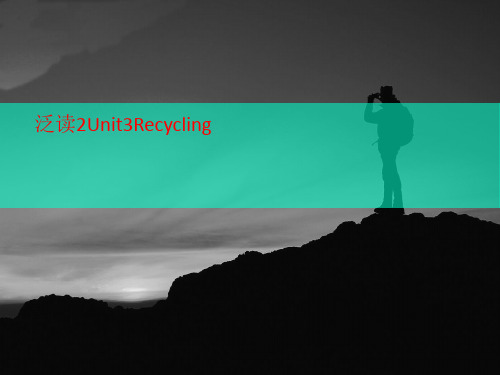
可回收?不可回收?
根据《城市生活垃圾分类及其评价标准》行业标准,可回收物 是指适宜回收循环使用和资源利用的废物。主要包括:1、纸类:
▪未严重玷污的文字用纸、包装用纸和其他纸制品等。如报纸、 各种包装纸、办公用纸、广告纸片、纸盒等;2、塑料:废容器 塑料、包装塑料等塑料制品。比如各种塑料袋、塑料瓶、泡沫 塑料、一次性塑料餐盒餐具、硬塑料等;3、金属:各种类别的 废金属物品。如易拉罐、铁皮罐头盒、铅皮牙膏皮、废电池等; 4、玻璃:有色和无色废玻璃制品;5、织物:旧纺织衣物和纺 织制品。 不可回收物指除可回收垃圾之外的垃圾,常见的有在自然条件 下易分解的垃圾,如果皮、菜叶、剩菜剩饭、花草树枝树叶等。 。
▪第二:它标志着商品或商品的包装是用可再生的材料做的,因 此是有益于环境和保护地球的。 在许多发达国这家,人们在购买商品时总爱找一找,看商品上 是否印有这个小小的三箭头循环再生标志。许多关心保护环境、 保护地球资源的人只买印有这个标志的商品,因为多使用可回 收、可循环再生的东西,就会减少对地球资源的消耗。
. Text Appreciation
Now you have 5 minutes to read Para. 3-4.
Words
profitability[英][ˌprɔfɪtəˈbɪlətɪ] n.获利,盈利(情况) insulate[英][ˈinsjuleit] vt.使隔离,使孤立;使绝缘,使隔热 swing[英][swiŋ] vt.& vi.(使)摇摆;(使)摇荡 n.摇摆,摆动;摆程,振幅;秋千;音律 replicate[英][ˈreplɪˌkeɪt] vt.复制,复写;重复,反复
▪
可回收?不可回收?
▪ 这个形成特殊三角形的三箭头标志,就是在这几年在全世界变得十分流行 起来的循环再生标志,有人把它简称为回收标志。它被印在各种各样的商 品和商品的包装上,在可乐、雪碧的易拉罐上你就能找到它。
泛读2Unit3Recycling

. Text Appreciation
Now you have 3 minutes to read Para. 1-2,
Words
recycling n. 再回收,资源再生 commitment n. [kəˈmɪtmənt]致力,承担义务,承诺 generation n. n.一代人;时代;生殖;产生 curbside n. 路边 grassroots n.基层,基层民众;草根adj.基层的;草根的; 乡村的 immense [iˈmens] adj.极大的,巨大的;浩瀚的,无边 际的 composting[ˈkɔmpɔstiŋ] n.堆制肥料v.混合肥料,堆肥 divert[英][daiˈvə:t] vt.使转移;转移注意力 Landfill n.废渣埋填法;垃圾填筑地 incinerator[英][ɪnˈsɪnəˌreɪtə ] n.(废物的)焚化炉
可再生资源?不可再生资源?
▪ 不可再生资源。主要指自然界的各种矿物、岩石和化石燃料,例如泥炭、 煤、石油、天然气、金属矿产、非金属矿产等。这类资源是在地球长期演 化历史过程中,在一定阶段、一定地区、一定条件下,经历漫长的地质时 期形成的。与人类社会的发展相比,其形成非常缓慢,与其它资源相比, 再生速度很慢,或几乎不能再生。人类对不可再生资源的开发和利用,只 会消耗,而不可能保持其原有储量或再生。其中,一些资源可重新利用, 如金、银、铜、铁、铅、锌等金属资源;另一些是不能重复利 用的资源 ,如煤、石油、天然气等化石燃料,当它们作为能源利用而被燃烧后,尽 管能量可以由一种形式转换为另一种形式,但作为原有的物质形态已不复 存在,其形式已发生变化。 可再生资源:金、银、铜、铁、铅、锌等金属资源,土壤、植物、动物、 微生物和各种自然生物群落、森林、草原、水生生物,太阳能 ,地热能 ,水能,风能,生物质能 (生物质是指通过光合作用而形成的各种有机 体,包括所有的动植物和微生物生物质分为林业资源、农业资源、生活污 水和工业有机废水、城市固体废物和畜禽粪便等五大类。。)
大学英语泛读教程Unit 3
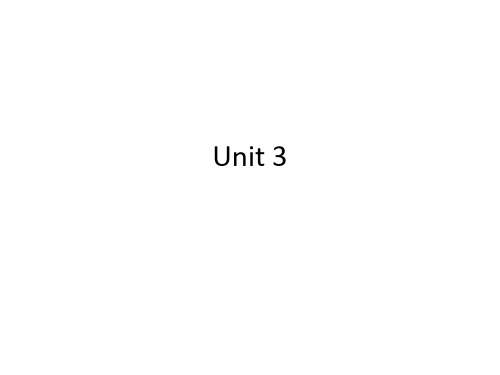
Key to Vocabulary ①
Noun admission reliability definition assumption behaviour variety partiality manager correlation adaption Verb admit rely define assume behave vary part manage correlate adapt Adjective admissible reliable definite assumable behavioral various partial manageable correlative adaptive Adverb admissibly reliably definitely assumably behaviorally variously partially manageably correlatively adapti• • • • • • • • • • • sign-language 符号语言 look in one’s eye直视某人的眼睛 tone of one’s voice语调 wag of the head 摇头 flicker of the eyelash 眨眼睛 clap on the shoulders拍肩膀 squeeze of the hand握手 wave of the hand 挥手 wringing one’s hand搓手 stamp of the foot 跺脚 clenched fist 握紧拳头 drumming one’s fingers有节奏地敲指头 gritting one’s teeth(发怒、下决心等时)磨(牙等);咬紧;咬牙切齿地说 gnashing one’s teeth因情绪激动)咬或磨牙 grimace做鬼脸 frown皱眉,蹙额 scowl 怒容 pout撅嘴 leer 睨视 hug 热烈拥抱;怀抱.紧抱在一起,互相拥抱 nudge用肘轻推 glance一瞥,扫视 • wink 眨(眼)(示意);闪烁,打信号,眼色 nod点头
英语泛读教程 unit 3 recyclingppt课件
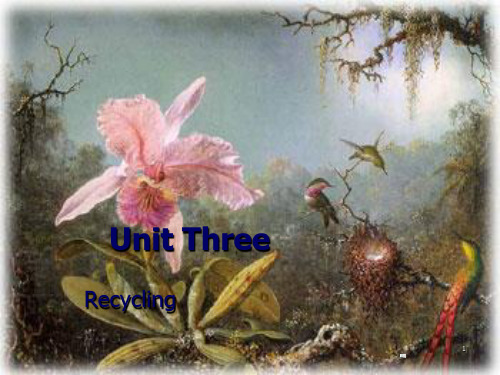
After recycled, can create…
Egg cartons Paper towel Tissue Toilet paper Newspaper Phonebooks
14
The process of taking old glass products and turning them into new, reusable glass products. Recycling old glass uses 40% less energy than manufacturing it from new.
Recycling old plastic products uses 20%-40% less energy than manufacturing it from new.
11
7PdETifofrePrEeTnEt types of plaHsDtPiEc
(PolyethyleneBiblioteka (high-density
•Recycled Plastic: Reduces greenhouse gas emission/ can be made into plastic lumber, which is durable
12
Americans use over 100million steel cans and over 200 million aluminum beverage cans everyday. Mainly aluminum and steel Products uses 95% less energy than manufacturing it from new materials.
8
Let’s see!
泛读教程--第三册--cloze-答案-原文
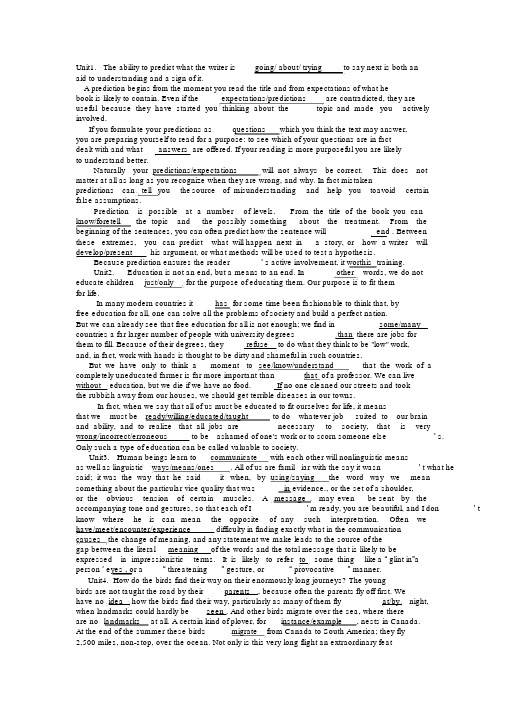
Unit1.The ability to predict what the writer is going/ about/ trying to say next is both anaid to understanding and a sign of it.A prediction begins from the moment you read the title and from expectations of what hebook is likely to contain. Even if the expectations/predictions are contradicted, they areuseful because they have started you thinking about the topic and made you activelyinvolved.If you formulate your predictions as questions which you think the text may answer,you are preparing yourself to read for a purpose: to see which of your questions are in factdealt with and what answers are offered. If your reading is more purposeful you are likelyto understand better.Naturally your predictions/expectations will not always be correct.This does notmatter at all as long as you recognize when they are wrong, and why. In fact mistakenpredictions can tell you the source of misunderstanding and help you to a void certainfalse assumptions.Prediction is possible at a number of levels.From the title of the book you canknow/foretell the topic and the possibly something about the treatment.From thebeginning of the sentences, you can often predict how the sentence will end . Betweenthese extremes,you can predict what will happen next in a story,or how a writer willdevelop/present his argument, or what methods will be used to test a hypothesis.Because prediction ensures the reader’ s active involvement, it worthis training.cation is not an end, but a means to an end. In other words, we do noteducate children just/only for the purpose of educating them. Our purpose is to fit themfor life.In many modern countries it has for some time been fashionable to think that, byfree education for all, one can solve all the problems of society and build a perfect nation.But we can already see that free education for all is not enough; we find in some/manycountries a far larger number of people with university degrees than there are jobs forthem to fill. Because of their degrees, they refuse to do what they think to be "low" work,and, in fact, work with hands is thought to be dirty and shameful in such countries.But we have only to think a moment to see/know/understand that the work of acompletely uneducated farmer is far more important than that of a professor. We can livewithout education, but we die if we have no food.If no one cleaned our streets and tookthe rubbish away from our houses, we should get terrible diseases in our towns.In fact, when we say that all of us must be educated to fit ourselves for life, it meansthat we must be ready/willing/educated/taught to do whatever job suited to our brainand ability, and to realize that all jobs are necessary to society,that is verywrong/incorrect/erroneous to be ashamed of one's work or to scorn someone else’ s.Only such a type of education can be called valuable to society.Unit3.Human beings learn to communicate with each other will nonlinguistic meansas well as linguistic ways/means/ones. All of us are famil iar with the say it wasn’ t what he said; it was the way that he said it when,by using/saying the word way we meansomething about the particular vice quality that was in evidence., or the set of a shoulder,or the obvious tension of certain muscles.A message may even be sent by the accompanying tone and gestures, so that each of I’ m ready, you are beautiful, and I don’ t know where he is can mean the opposite of any such interpretation.Often wehave/meet/encounter/experience difficulty in finding exactly what in the communicationcauses the change of meaning, and any statement we make leads to the source of thegap between the literal meaning of the words and the total message that is likely to beexpressed in impressionistic terms.It is likely to refer to some thing like a “ glint in”aperson ’ eyes , or a“ threatening” gesture, or“ provocative” manner.Unit4. How do the birds find their way on their enormously long journeys? The youngbirds are not taught the road by their parents, because often the parents fly off first. Wehave no idea how the birds find their way, particularly as many of them fly at/by night,when landmarks could hardly be seen . And other birds migrate over the sea, where thereare no landmarks at all. A certain kind of plover, for instance/example, nests in Canada.At the end of the summer these birds migrate from Canada to South America; they fly2,500 miles, non-stop, over the ocean. Not only is this very long flight an extraordinary featof endurance, but there are no landmarks on the ocean to guide/direct the birds.It has been suggested that birds can sense the magnetic lines of force stretching from thenorth to south magnetic pole of the earth, and so direct themselves. But all experimentshitherto made to see whether magnetism has any effect/influence whatsoever onanimals have given negative results. Still,where there is such a biological mystery as migration,even improbable experiments are worth trying.It/this was being done inPoland, before the invasion of that country, on the possible influence of magnetism onpath- finding.Magnets were attached to the birds’heads to see if/whether theirdirection-sense was confused thereby. These unfinished experiments had, of course, tobe stopped.Unit5.Man first existed on earth half a million years ago. Then he was little more thanan animal; but early man had several big advantages over the animals. He had a largehead/brain, he had an upright body , he had clever hands; he had in his brain specialgroups of nerve cells, not found in animals, that enabled him to invent a language anduse it to communicate with his fellow men.The ability to speak was of very greatuse/value/significance/importance because it was allowed men to share ideas, and toplan together,so that tasks impossible for a single person could be successfullyunder-taken by intelligent team-work. Speech also enabled ideas to be passed on fromgeneration to generation so that the stock of human knowledge slowly increased.It was these special advantages that put men far ahead of all other living creatures inthe struggle for survival/existence. They can use their intelligence handing/overcomingtheir difficulties and master them.nguage varies according to sex and occupation.The language of mandiffers subtly from that of women.Men do not usually use expressions such as“ its darling,” andwomen tend not to swear as extensively as men. Likewise, the languageused in addressing men and women differs subtly: we can compliment a man on a newnecktie with the compliment/words“ what a pretty tie, that is!” but not with“ how pretty you look today! ”----an expression reserved for complimenting a woman.The occupation of a person causes his language to vary, particular in the use he makes oftechnical terms, that is, in the use he makes of the jargon of his vacation. Soldiers, dentist,hairdressers,mechanics,yachtsmen,and skiers all have their particular special languages. Sometimes the consequence is that such persons have difficulty in communicating with people outside the vacation on professional maters because thetechnical vocabulary is not understood by all. Although we can relate certain kinds ofjargon to levels of occupation and professional training,we must also note that all occupations have some jargon, even these of the criminal underworld. There may well bea more highly developed use of jargon in occupations that require considerable education,in which words,and the concepts they use , are manipulated rather than objects,forexample in the legal and teaching circle/world/field and in the world of finance.Unit7. The space age began on October 4, 1957, when Sputnik I was launched. Thisfirst man-made satellite was followed by many others,some of which went around thesun. Now the conquest of the space between the planets, and between the earth and thesun, continues at a rapid rate.Each mew satellite and space probe gives scientists new information. As men exploreouter space,some of the questions they have long asked/wondered about will beanswered at last.The greatest question of all concerns life itself. Is there intelligent life out side theearth? Are there people, or creatures of some sort/kind living on Mars, Venus, or someother planet of the solar system? Are there planets orbiting/going/circling around starsother than our sun?The only kind of life we know about would have to be upon a planet.Only a planetwould have the temperatures and gas that all living things seem to need. Until a shorttime ago, we thought there were only a few planets. Today, scientists believe that manystars have planets going around them.We know that there are nine planets in our own solar system-Mercury, Venus, Earth,Mars, Jupiter, Saturn, Uranus, Neptune and Pluto. If any other planets exist in our solarsystem, or anywhere else, our telescopes are not powerful enough to pick up their feeblereflected light. But astronomers guess that one star in a hundred has at least one planetwhere life could exist.We are quite sure that life could begin on a young planet. A new plant would be likelyto contain great seas, together with heavy clouds of water vapor and other gases. Electricstorms would be common. It is possible that simple living cells might from when electricitypassed through the clouds.An experiment made in1952at the University of C hicagoseems to prove this. By passing electricity through nonliving materials, scientist madecells like those of living creatures.Unit8.At the beginning of the nineteenth century the only acceptable roles forwomen were domestic there was virtually nothing for them to do except stay at home orhire out as maids, governesses, and, before long, teachers. Women were not allowed toown property-in most cases, not even the clothes they wore. A working wife was notallowed to keep her wages but was required to turn them over to her husband. In case ofseparation or divorce, a woman had no legal claims on her husband and was not allowedto keep the children. She had to legal status, which meant that she was not permitted tobring suit or to give testimony in courts. Often, she was not permitted to inherit propertyor to make a will. She was barred from public office and excluded form public lifegenerally.For the most part,women lacked opportunities for education,vocationaltraining, and professional employment. The national consensus was that women belongin the home, and determined efforts were made to see that they stayed there.Unit9.Sydney’ s best feature is her harbor.Most Sydneysid ers can see at least aglimpse of blue sea from their windows.Nearly everyone lives within an hour from abeach.On weekends sails of all shapes,sizes and colors glide across the water.Watching the yacht races is a favorite Saturday activity.The harbor divides Sydney into north and south sections. The harbor bridge connectsthe two. It was built in 1932 and cost 20 million.Another Sydney symbol stands on the harbor shore.Sydney’ s magnificent operahouse celebrated its20th anniversary last year.Danish designer Jorn Utzon won aninternational contest with his design. The structure contains several auditoria and theaters.But not all concerts are held in the building. Sunday afternoon concerts on the building’ souter walk attract many listeners.Sydney’ strendy suburb is Paddington.Houses are tightly packed together. Manywere first built for Victorian artists. Now fashionable shops, restaurants, arts galleries andinteresting people fill the area.The best time to visit is Saturday, when vendors selleverything. So there is one of the world’ s most attractive---citiesSydney, Austrian.Unit 10Architectural design influences how privacy is achieved as well as how social contact ismade in public places. The concept of privacy is not unique to a particular culture but what it means isculturally determined.People in the United States tend to achieve privacy by physically separating themselves from others. Theexpression“ good fences make good neighbors” is a preference for privacy from neighbors’ hom can afford it, each child has his or her own bedroom. When privacy is needed, family members may closetheir bedroom doors.In some cultures when individuals need privacy, it is acceptable for them simply to look into themselves. Thatis, they do not need to remove themselves physically from a group in order to achieve privacy.Young American children learn the rule “ knockbefore you enter which”teaches them to respect others ’privacy. Parents, too, often follow this rule priorto entering their children’ s rooms. When a bedroom door is closed it may be a(n) sign to others saying,““I Ineed’m privacy,angry,“”Do ornot” disturb. I’ busy.” For Americans, the physical division of space and the use of architectural features permit a sense of privacy.The way space is used to help the individual to achieve privacy, to build homes or to design cities if culturally influenced. Dr. Hall summarizes the relationship between individuals and their physical surroundings:Man and his extensions constitute one interrelated system. It is a mistake to act as though man was onething and his house or his cities, or his language wee something else.Unit11.The Library of Congress is the largest library in the world.Its books,pamphlets, documents, manuscripts, official, papers, photographs, and prints amount tosome86million items---a number that swells day by day----housed on535miles ofshelves.Congress authorized a library in 1800, which amounted to three thousand books and afew maps when it was destroyed when the British burned the Capitol in 1814. to replace it,Thomas Jefferson sold the government his own library of almost 6500 volumes---thefinest in the nation at the time. The collection, again housed in the Capitol, had grown to55000 when a fire burned more than half of it. In1866 a portion of the Smithsonian Institution library’s was added to the library of Congress,and in the same year the government entered an international program by which copies of U.S. documents wereexchanged for those of other countries. The copyright law of 1870 ensured the librarywould always be up to date by requiring publishers to send two copies of each book published to the library in order to obtain copyright.By 1870 the collections had outgrown its Capitol quarters. A suggestion to raise the Capitol dome and fill it with bookshelves was rejected, and in 1873 Congress authorized acompetition for the design of a library building. A variety of disputes delayed constructionfor more than a de cade, but the library’ s Thomas Jefferson Building was finally opened in 1897.Unit12.As a nation, we starting to realize that we can solve the’t solid waste dilemmajust by finding new places to put trash. Across the country, many individuals, communities and business have found creative ways to reduce and better manage theirtrash through a coordinated mix of practices that includes source reduction.Simply put source reduction is waste prevention.It includes many actions that reducethe disposal amount and harmfulness of waste created. Source reduction can conserveresources, reduce pollution, and help cut waste disposal and handing costs (it avoids thecosts of recycling, landfilling, and combustion).Source reduction is a basic solution to too much garbage: less waste means less of awaste problem. Because source reduction actually prevents the increase of waste in thefirst place ,it comes before other measures that deal with trash after it is already generated. After source reduction, recycling is the preferred waste management optionbecause it reduces the amount of waste going to landfills and conserves resources.Unit13.The first step in helping the patient is to accept and acknowledge his illness.The cause of symptoms must be found, and measures to relieve them and to prevent recurrence must be taken. Thorough examinations are essential. Although the physicianmay suspect that the illness is due to emotional rather than physical cause,he mustsearch carefully for any evidence of physical disease.It is not unknown for an illness considered psychosomatic to be later diagnosed as cancer or some other disease. The thorough search for physical causes of the symptoms helps to gain the patient ’ s confidence. He knows that his condition and symptoms are being taken seriously. If noorganic basis for his complaints is found, he usually will find this news easier to acceptwhen he knows he has had a thorough examination.Finding no physical cause for thedisorder points the way to understandi ng the patient’ s condition. What is the cause? Is it emotional stress?If so,what kind?What are the problems which are upsetting the patients?Unit14.The work of French scientist Jean Baptiste Lamarck(1744-1829)has contributed to the theory of evolution. Lamarck believed that the environment shaped thenature/trait/characteristic of plant and animal life. he believed that the bodies of plantsand animals changed/had to fit their environment and a useful physical change would bepassed on to the plant’ s or animal’ s offspring.For example, Lamarck thought that giraffes developed long necks because they hadto stretch to get/eat the leaves of tall trees for marck didn ’think that giraffes possessed/developed/had long necks all at once, however. He thought that the earliestgroup of giraffes stretched/lengthened their necks a small amount.Their offspring inherited this longer neck. The offspring then stretched their necks a little bit longer.They passed this even longer neck on to their own offspring.After many generations, giraffes developed the long necks that they have today.Not all of Lamarck theory’s is accepted today. Most scientists do not believe that theenvironment has a(n)effect/influence on the evolution of life forms. Nut t hey don ’ t agreewith the notion/idea that a physical change in a plant’ s or animal’ s body is passed on to the offspring. Instead, they believe that a change must occur in the plant’ s or animal’ s cells before a change in offspring can take place.Unit15.In a very big city, in which millions of people live and work,fast,frequentmeans of transportation are of the greatest importance. In London, where most peoplelive long distance/away from their work, all officers, factories and schools would have tochoose if the buses, the trains and the Underground stopped work.Originally the London Underground had steam trains which were not very differentfrom other English trains, except that they went along in big holes under the ground inorder to keep away from the crowded city above their heads.Steam trains used coal,which filled the underground stations with terrible smoke. As a result, the old trains weretaken away, and electric ones put in their place. Now the London Underground is veryclean, and the electric trains make faster runs possible.At every Underground station/stop there are maps of all the Underground lines in London, so that it is easy to see how to get wherever one wants to go. Each station has itsname written up clearly and in large letters several times, so that one can see when onecomes to where one must get out.At some stations one can change to a different underground train,and in some places, such as Piccadilly, there are actually three linescrossing each other. The trains on the three lines are not on the same level, so that thereshould not be accidents. T o change trains, one has to go up or down some stairs to a newlevel. It would be tiring to have to walk up these stairs/steps, so the stairs are made tomove themselves,and all that the people/passengers have to do is to stand and becarried up or down to where they wish.In fact,everything is done to make the Underground fast and efficient.Unit16.Why “ grandfather” clock? Well, these clocks were passed through the familyand so were always thought of as“ grandfather’ s clock.” But the first domestic timepieceswere hung from a nail on the wall.Unfortunately dust got into the works and even worsechildren used to swing from the weights and the pendulum. So first the face and worksand then the weights and the pendulum were protected by wooden cases. Before longthe clock was nearly all case and was stood on the ground/floor and called,not surprisingly, a long-case clock. These“ grandfather” clocks were very expensive,adem asthey were from fine wood ,often beautifully carved or decorated with ivory.Famousmakers of this period included Thomas Tompion, John Harrison and Edward East, butdon’ t get too excited if you find that the clock Grandma left you has one of these nameson the back. Before you start jumping up and downing and shouting,“ we’ re rich, we’ re rich,”remember that plenty of people before the20 th century had the idea of makingcheap clocks/timepieces of famous original and“ borrowing” the names of theirttersbe.And don’ tforget that the first chiming mechanism wasn’ t invented/created/made until1695, so a chiming clock, however charming it sounds, will date from the 18th century. Afake/false/imitated late 17 th century grandfather clock made by East sold recently for justunder 20000.Unit17. Suppose you send your child off to the movies for three hours next Sunday. Andthree hours on Monday and the same number of hours Tuesday, Wednesday, Thursday,Friday, and Saturday. Thus is essentially what is happening to the average child in American today, except it is not the screen in the movie house down the street he sits infront of, it is instead the television set right in your own house.According to the Nielsen Index figures for TV viewing, it is dais that by the time a childgraduates from high school he has had 11000 hours of schooling, as opposed to 15000hours of viewing . I would like to repeat that. By the time the child is 18 years old, he hasspent more hours in front of TV than he has in school.Over TV he will have witnessed bythat time some 18000 murders and countless highly detailed cases of robbery,arson, bombing,shooting,beatings,forgery,smuggling,and torture---averaging approximatelycone per minute in the standard television cartoon for children under the age of ten. Ingeneral, seventy-five percent of all network dramatic programs contain violence.Dr.Albert Bandura of Standford University reaches/draws two conclusions aboutviolence on TV: (1) that it tends to reduce the child tions’againstinhibi acting in a violent,aggressive manner, and (2) that children will imitate what they see. Dr. Bandura pointsout that a child won’ t necessarily run out and attack the first person he sees afterwatching violence on the screen, but that, if provoked later on, he may very well put whathe has learned into practice .One of the lessons of television is that, violence works. If you have a problem with someone, the school of TV says to slap him in the face , stab him in the back. Because most of the program has shown how well violence has paid off, punishment at the end tends not to have much of an inhibitory effect.。
英语泛读教程第2册第三单元PPTUnit 3 Recycling
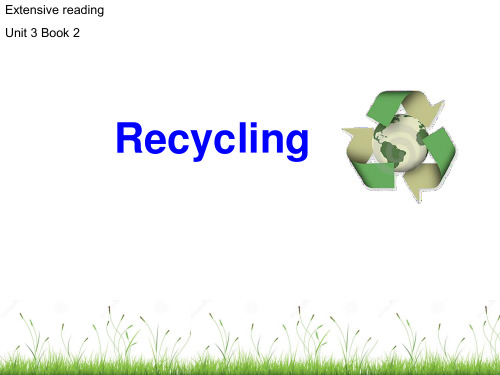
Recyclable materials
废纸:报纸、书本纸、各种包装用纸、办公用纸、 广告纸片、大小纸盒等(但纸巾和厕纸不能 回收)
塑料:各种塑料袋、塑料瓶、塑料包装、泡沫塑料、 一次性塑料餐盒餐具、硬塑料等
玻璃:玻璃瓶和碎玻璃片 金属:易拉罐、铁皮罐头盒、铅皮牙膏皮、废电池
等 有机物:落叶杂草、菜根果皮、鸡肠鱼肚、蛋壳鳞
Part 1 Introduction
Why is recycling one of the best environmental success stories of the late 20th century? Recycling is a nationwide, grassroots effort. • Curbside recycling collection programs reach
the majority of the American population. • Diversion rate resulting from recycling and
composting keeps increasing. • Recycling boxes 3 feet long stacked end to end
Unit overview
Pre-reading discussion Background information Text analysis Notes to the text Post-reading discussion Related information Exercises
Pre-reading discussion
economic and environmental benefits. • Recycling enhances the sustainability of the
英语泛读教程3__unit_3词汇表和课堂思考题
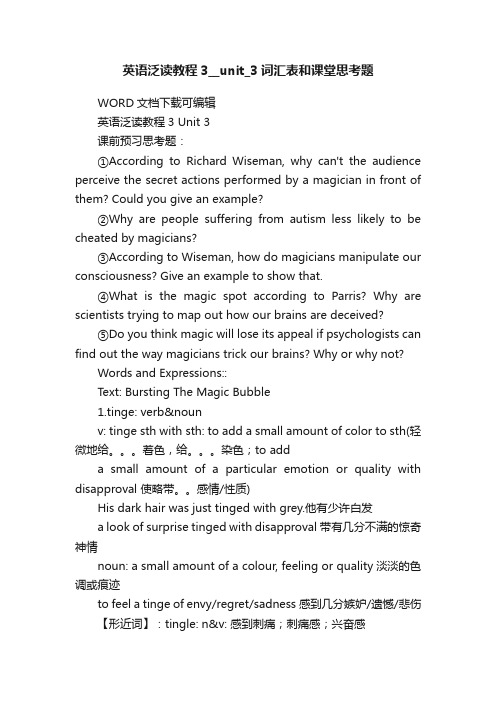
英语泛读教程3__unit_3词汇表和课堂思考题WORD文档下载可编辑英语泛读教程3 Unit 3课前预习思考题:①According to Richard Wiseman, why can't the audience perceive the secret actions performed by a magician in front of them? Could you give an example?②Why are people suffering from autism less likely to be cheated by magicians?③According to Wiseman, how do magicians manipulate our consciousness? Give an example to show that.④What is the magic spot according to Parris? Why ar e scientists trying to map out how our brains are deceived?⑤Do you think magic will lose its appeal if psychologists can find out the way magicians trick our brains? Why or why not?Words and Expressions::Text: Bursting The Magic Bubble1.tinge: verb&nounv: tinge sth with sth: to add a small amount of color to sth(轻微地给。
着色,给。
染色;to adda small amount of a particular emotion or quality with disapproval 使略带。
Recycling 大学英语泛读

7
throughout most of the 20th century (Para. 10) in the early 1970s (Para. 11) in the 1980s (Para. 12) by the mid-1990s – From 1990 to 1997
5
Structure
Part IV. ( Paras.13-15) Communities such as Ann Arbor provide useful
LOGO
Recycling
words
◆ curbside (para.1) 路边 ◆ immense(para.1) 极大的 ◆ composting(para.1) 混合肥料 ◆ mcinerator(para.3) 焚化炉 ◆ diversion(para.4) 转移 ◆ replicate(para.4) 复制的 ◆ municipal(para.5) 市政的
2
words
◆ beverage (para.5)饮料 ◆ sustainability(para.6) 持续性 ◆ stimulates(para.6)刺激 ◆ scrap(para.8) 废料 ◆ surges(para.9) 汹涌 大浪 ◆ diminish(para.9) 减少、缩小 ◆ multimillion(para.12) 数百万 ◆ manufacturing(para.12) 制造、生产
Structure
Part III. (Paras. 7 – 12) (Para. 8) Recycling isn’t new; it’s as old as
英语泛读教程3Unit 3
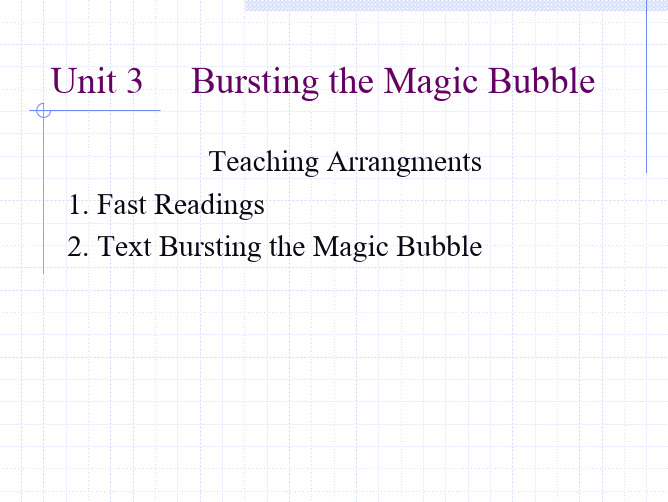
4. In some cases magicians act as inventors and explorers of the latest sciences to come with ingenious illusions. 5-7 In the exhibit, visitors can explore the science of illusions without losing the enchantment that a magic show creates. Visitors can explore the science and art of visual illusions from two perspectives: that of the audience and that of the magician’s apprentice. …As the audience…As the magician’s apprentice…But all will not be revealed.
Language points: 1. tinge: to give a slight degree of a quality to使带有一点…性质 Her remarks were tinged with envy/irony.她的话里带有几分嫉妒 /讽 刺。 His smile was tinged with cruelty .他笑里藏刀。 2. Filter out: remove by passing through a filter滤除, 过滤; (消息等)泄漏 We must filter out the dirt.我们必须滤除尘垢。 The news of his appointment filtered out before it was officially advertised. 他被任命的消息在还没正式公布前就被透漏出去。 3. Sleight of hand: skill and quickness of the hands in doing sth He makes the coin disappear by sleight of hand. 他以巧妙的手法使这枚硬 币不见了。 Get to grips with: to deal seriously with sth difficult 认真应付难题 The speaker talked a lot, but never really got to grips with the subject. 演 说者讲了一大套,但并没有真正谈到正题。
泛读教程第三册答案Unit 3PPT精选文档
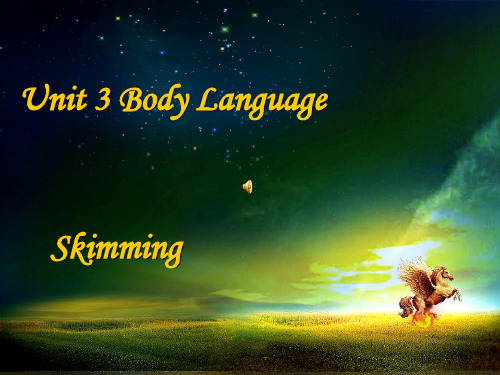
SUBVOCALIZATION
• ---talking while you read, either in your mouth, your throat, and or in your head--or all three at some point. It is not always bad given what and why you are reading, but in most cases, since you already know many of the words and structures you are reading, sub vocalizing is a bad habit that offers you some security for sure that you think you may need, but for the average student who needs to read a lot of stuff, it can be deadly. There is a time and place for sub vocalizing, but it does indeed limit your reading speed to 200-250 words per minute or lower, because that is about as fast as you can talk!
and • subvocalizing, which is talking to yourself in your head as you
silently read. • Both of these will slow you down to the point in which you find
- 1、下载文档前请自行甄别文档内容的完整性,平台不提供额外的编辑、内容补充、找答案等附加服务。
- 2、"仅部分预览"的文档,不可在线预览部分如存在完整性等问题,可反馈申请退款(可完整预览的文档不适用该条件!)。
- 3、如文档侵犯您的权益,请联系客服反馈,我们会尽快为您处理(人工客服工作时间:9:00-18:30)。
✓Most widely used products in the U.S.
✓Takes up about 10% of our total stream and it is composed mainly of the non-renewable resource petroleum.
✓Recycling old plastic products uses 20%-40% less energy than manufacturing it from new.
II. Text Comprehension
2.1 Comprehension Qs
2.2 Text Analysis IV. Home Reading
4.1 Post-reading Qs
4.2 Difficult sentences
Objectives:
To know some serious problems threatening the survival of human beings.
Recycling old paper products uses 60% less energy than manufacturing it from new materials.
Most recognized recycled paper products
➢Newspaper ➢Shredded paper ➢Phonebooks ➢Cardboard ➢Magazines ➢Computer paper
The process of collecting materials that are considered trash and remanufacturing them into new products that can be resold and used again.
conserves natural resources
Unit Three
Recycling
Navigation Guide
I. Related Information 1.1 Background Information 1.2 Preview Qs
III. Difficult Points 3.1 Key Words 3.2 Key Phrases
Milk containers Trash bags Yogurt containers Liquid laundry detergent containers Shampoo bottles Juice containers
•Recycled Plastic: Reduces greenhouse gas emission/ can be made into plastic lumber, which is durable
❖Americans use over 100million steel cans and over 200 million aluminum beverage cans everyday. ❖Mainly aluminum and steel ❖Products uses 95% less energy than manufacturing it from new materials.
To be aware of the issues concerning environmental protection.
To understand the ways to solve the environmental problems
Unwanted or useless materials.
7PdETifofrePrEeTnEt types of plaHsDtPiEc
(Pollate)
polyethylene)
Soda and water bottles Mouthwash bottles Plastic wrap Peanut better and other food jars Salad dressing bottles
Saves energy
Produces less greenhouse
Prevents the destruction of natural habitats
Decreases soil erosion associated with mining and logging
Let’s see!
Glass Metal Paper Plastic Tires
After recycled, can create…
✓Egg cartons ✓Paper towel ✓Tissue ✓Toilet paper ✓Newspaper ✓Phonebooks
The process of taking old glass products and turning them into new, reusable glass products. Recycling old glass uses 40% less energy than manufacturing it from new.
❖Aluminum is an ore, which is a mineral.
Less land and Water pollutions
The process of manufacturing old paper products and turning them into new, reusable paper products.
TYPES of Glass Products can be recycled
•Beverage containers •Food Jars
Benefits of recycling of Recycling glass
✓Can be recycled over again and never lose its quality or quantity ✓Creates 20%less air pollution ✓Reduces water pollution by 50% ✓Saves energy to light a 100-watt light bulb ✓Reduces that amount of landfill space that is used
